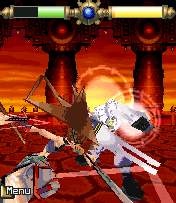In 1998, Brave Fencer Musashi became a sleeper with PlayStation customers. Combining the quick swordplay of a beat-'em-up with the skill building and style of a role-playing game, Brave Fencer appealed to a variety of players. After seven years of stagnancy, the Musashi franchise has been reborn on the PlayStation 2 and mobile. On the latter platform, the game has been appropriately simplified and structured almost like a fighting game. While it's in sore need of more-varied attacks, the context-sensitive control and distinctive style make for a pretty good game.

Musashi is broken up into levels, each of which is populated by a handful of fearsome monsters from the new console game. Many of these have special attacks and animations, just like Musashi, and confrontations can be quite exciting. Certain character models are reused between stages, but new and progressively challenging artificial intelligence scripts keep things fresh.
Musashi responds differently to your commands depending on what's taking place onscreen, as well as depending on which buttons you've pressed previously. If you press left as your opponent strikes, Musashi will perform a quick dodge, positioning himself for an open shot at his adversary. Pressing the attack button will then perform a dashing slash, inflicting heavy damage.
This context-sensitive control is a mixed blessing, however, as it would be nice to have Musashi move more predictably. Special moves are almost automatically executed when the mobile samurai's opponent is low on health, which feels like cheating. A few other attack buttons would have allowed for more-varied moves and key combinations. Nonetheless, this simplified control scheme will appeal to cell phone button mashers, and it serves to make the game more accessible.
Musashi's small-scale confrontations allow for detailed character models, and the result is a bevy of memorable enemies, united by the game's overblown anime style. Musashi himself sports a midriff-bearing tank top and wears his hair in the aggressive spikes that have become iconic of the PlayStation era. Musashi looks quite a bit better and runs much smoother than the majority of V CAST offerings for the LG VX8000, though.

The game's audio puts the hardware to decent use as well. The Musashi theme music plays jauntily (and repeatedly) over the splash screen and menus. During play, you'll hear some realistic-sounding clanks when metal meets metal. Different sound effects accompany dashes, direct hits, and the barrage of attacks that comprise a special move.
Ultimately, Musashi is a bit oversimplified. Buttons for heavy and light slashes, or even a dedicated special move key, would have gone a long way toward making Mobile Samurai's gameplay deeper. On the flip side of the coin, Musashi's very easy to pick up and enjoy, which is a compulsory quality on mobile. If you're a fan of the series, or of beat-'em-up games in general, Musashi is a good game that will provide a couple hours of enjoyment.